Series 10: The Doctor Falls (Finale) Review
Clint Hassell gives his verdict on the twelfth episode of Doctor Who Series 10.
![]()
Note: this review contains full spoilers for episode 12 of Series 10.
While the penultimate episode of a Steven Moffat-penned series of Doctor Who can be thrilling – – it is the first time the audience gets a glimpse at how the myriad pieces of his story arc come together – – his finales have been inconsistent in quality. Not since “The Big Bang” has Moffat delivered an acclaimed finale that both reflected on the themes of the series and concluded the majority of the ongoing subplots, drawing the series to an effective close. “The Wedding of River Song,” “The Angels Take Manhattan” (a mid-series finale), “The Name of the Doctor,” and “Death in Heaven” all sacrificed plot logic in lieu of a grand, emotional payoff, while the underrated “Hell Bent” seemed to suffer in comparison to the genius of the preceding “Heaven Sent.” While never quite matching the Series 5 or 9 finales, Series 10’s “The Doctor Falls” proves to be a capable end to a storyline that deconstructed the series’ tropes by examining closely the companion experience.
“The Doctor Falls” is light on plot, trading the epic setting of a spaceship, time-dilated by a nearby blackhole, for a quaint farmhouse. The body horror, so prominent in “World Enough and Time,” is gone, reducing the emergent Cybermen to mere cannon fodder. While the shift is jarring, as in much of Series 10, the plot is meant to serve as a backdrop for character development.
This is not to say that the episode lacks style, as Moffat artfully incorporates a great deal of symbolism into the script. The Doctor references an apple in biblical terms, and man-child Nardole utters a line from Peter Pan, as he guides a gang of lost boys (and girls) to their new home. The episode’s most subtle reference is the song to which the Master and Missy dance, in the post-credits scene. Titled “Midnight, the Stars and You,” the song foreshadows the Doctor’s final words – – “Pity, there’s no stars. I hoped there’d be stars.”
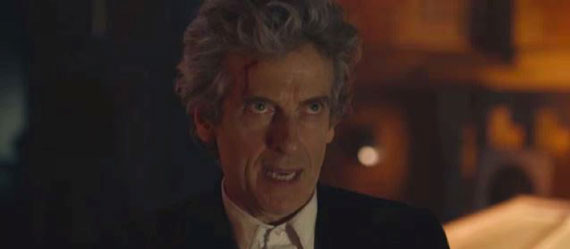
Still, the strongest aspect of “The Doctor Falls” is its character development. The episode makes effective use of Bill’s seemingly irreversible cyber-conversion to examine a Doctor struggling in the face of an unsolvable problem. Despite asserting, “Bill, I will fix this,” he has difficulty admitting that even his capacity for optimism has been reached:
Bill: “You said you could fix this. That you could get me back . . . . Were you lying?”
the Doctor: “No.”
Bill: “Were you right?”
the Doctor: “ . . . No.”
When Bill pointedly asks, “We’re not going to get out of this one, are we?” the Doctor hopelessly opines, “Well, I don’t know. There are always possibilities.” That this line compares this a similar one from “The Pilot” is the biggest hint at Heather’s return, in the episode’s resolution.
However, while Twelve is more prevalent in “The Doctor Falls” than “World Enough and Time,” he spends most of his screen time serving as a foil for characters exiting the narrative. For example, in a blustering oration, the Doctor admits that he is willing to sacrifice himself to extend the human civilians’ lives, not because he wants to win, or because it’s “fun,” or “easy,” but because it’s “right . . . decent . . . and, above all . . . just kind.” While the scene does give lead actor Peter Capaldi ample room to display his talents, the speech is poignant, as its message falls on deaf ears for the Master and seems to barely affect Missy, though she later recants and frees herself from the Master’s influence.

Why doesn’t the Master and Missy kill the captive Doctor, when they have the chance? Do they merely want to taunt him with Bill’s fate, or, is Missy – – and maybe even the Master – – always on his side? The episode toys with both possibilities, in a scene filled with clever wordplay:
the Doctor: [to the Master] “Knock yourself out.”
Missy: [using her sonic umbrella to fell the Master] “Your wish is my command. I was secretly on your side, all along, you silly sausage.”
the Doctor: “Is that true?”
Missy: [guffaws] “Don’t spoil the moment.”
the Doctor: “Seriously, I need to know. Is that true?”
Missy: “It’s hard to say. I’m in two minds. Fortunately, the other one’s unconscious.”
Conversely, the Master delights in hurting the Doctor one final time and is quite abusive to Missy. Further, he is a bully to Bill, calling her “Robomop,” and describing the years they were together as “worth it,” because it resulted in her hideous, cyber-converted form. Like an abusive boyfriend, the Master tries to use Bill’s own distorted self-image against her. A quick scene of the Master attempting to apply eyeliner hints that his treatment of others is fueled by his anger regarding his inevitable regeneration into Missy – – typical behavior of a bully, who often lashes out at others when he feels out of control.
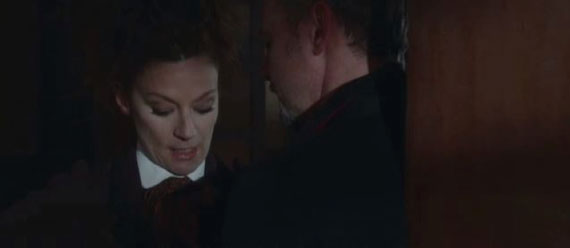
Unfortunately, beyond these snippets of character examination, “The Doctor Falls” does little to justify the inclusion of two Masters within the episode. Missy and the Master kill a Cyberman, with help from the Doctor and Bill, but there is little more to their partnership – – the two do not affect the story in an appreciable way. Logistically, the Master’s presence in the episode is only necessary to ensure an epic death for Missy, as actress Michelle Gomez exits the series. The idea that Missy influences her past self to “always, always carry a spare dematerialization circuit” is cute, but one that only serves to explain Missy’s sudden presence in Series 8. Yes, the question of how the Master became Missy is answered in a delicious scene where the two admitted backstabbers betray one another with brutal finesse. It is always fun to see multiple Doctors interact with each other, but, often, their comradery eclipses moments of examination that can only occur on Doctor Who, where characters can literally face their past selves. While the scene is fascinating to watch, since the two Masters contribute little to the overall plot, and since the Master’s presence seems predicated on Missy’s departure, the moment doesn’t feel earned. This creates a conundrum: one of the episode’s most griping scenes is also its most unnecessary.
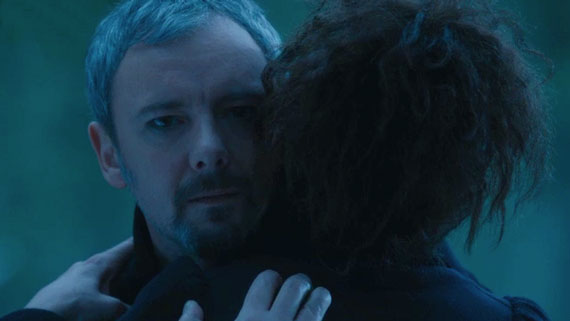
Is Missy really dead? Probably, however, the Master is too great a villain to remain dead forever. No matter the predicament, the Master always escapes it, somehow, to plague the Doctor again. Surely, this time is no different. Undoubtedly, the future Master will still be evil, with Missy having learned her lesson, paying with her life for siding with the Doctor.
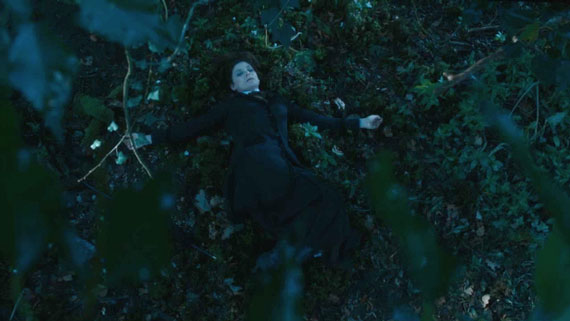
Similarly, the episode’s plot is stymied by a series of unnecessary scenes that attempt to create drama from Bill’s inability to process her new cyber-form. Certainly, portraying the cyber-converted Bill as a human, as often as possible, is a necessity; it would be foolish to put an actress of Pearl Mackie’s caliber behind a mask for the majority of the finale. The narrative does offer an explanation as to why Bill’s mind evades upgrading, and why she continues to see herself as human – – her mind built up a tolerance to mental trickery during her six months of oppression, in “The Lie of the Land.” However, the amount of hand-holding that the script feels like the audience needs to accept this conceit of “‘human’ Bill is really a Cyberman” slows the episode to a crawl that neither Mackie’s talent, nor a rare turn of anger from Bill can alleviate.
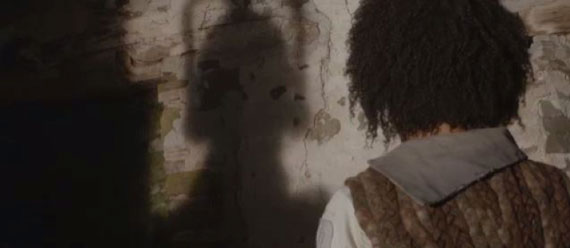
Thankfully, the rest of the episode is focused on crafting the perfect exit for such a complex companion, resulting in this fitting final exchange between Bill and the Doctor:
Bill: “Uh, hey, um, well, you know how I’m usually all about women an-and kinda people my own age?”
the Doctor: “Yeah?”
Bill: “Glad you knew that.”
In typical Doctor-fashion, it takes the alien Time Lord a moment to piece together her intended message. Despite relating with women and friends her own age, Bill has chosen to spend much of her time with the Doctor, an old man, because he inspires her, because he is the surrogate parent she never had, and because she loved him. The line defines their relationship unlike any other moment in all of Series 10.
Say what you want about the resolution of Bill’s story arc – – that Heather is a magical deus ex machina, or that Bill gets basically the same ending as previous companion Clara (which, she totally does, and that’s not a bad thing, as “Hell Bent” is a more fitting end for Clara’s character than death-by-raven-shaped-plot-device) – – what “The Doctor Falls” lacks in narrative sense, it more than makes up for in emotional yield. Hints that Heather’s reappearance was foreordained are evident, with Heather’s ability to find Bill in her moment of need, to “pilot” the TARDIS, to reform Bill’s body, and to travel unaided through time and space all clearly laid out in the Series 10 premiere. “I left you my tears, remember?” not only recalls “The Pilot,” but provides a reason for including the clichéd image of a weeping Cyberman in the final scene of “World Enough and Time.”
Then, this happens:

Series 10 deserves praise for presenting such a deft look at Bill’s sexuality. While a specific sexual behavior – – even kissing – – isn’t necessary to confirm one’s sexual identity, this is certainly a moment the show has earned, and a fitting end, as the TARDIS doors literally close on Bill’s tenure as companion.

Ironically, the character who is best served by “The Doctor Falls” is Nardole, who does more as a companion in this one episode – – finding a shuttlecraft that takes everyone to Level 507, rallying the civilians to prepare for Operation: Exodus, utilizing the mechanical framework underneath the solar farm’s organic elements to blow up the Cybermen, leading the children to safety on Level 502 – – than he did in all of Series 10. In his last conversation with the Doctor, Nardole hints at his shady past as an immoral, compulsive black market dealer. This final reveal is the last piece necessary to place Nardole’s backstory within the framework of Series 10’s overarching theme. Twelve takes Nardole as a companion not just because Nardole reminds the Doctor of River Song, his late wife, but also to offer Nardole a chance for redemption and an honorable life. This is a strong element of Captain Jack Harkness’ storyline, and certainly the impetus for the Doctor sparing Missy’s life. Further, this means that Series 10 examines three characters – – the Doctor, Nardole, and Missy – – all trying to escape their pasts, with only Nardole truly succeeding. Nardole’s goodbye message to his fellow travelers, “Doctor . . . Bill . . . you’re wrong, you know. Quite wrong. I never will be able to find the words,” demonstrates that his tenure as companion has had a greater effect on Nardole than he will admit, his deadpan humor a mask for his emergent heart.

Thematically, the modern era of Doctor Who differs most from the classic era in defining the alien Doctor through the companion’s eyes; thus, it is fitting that “The Doctor Falls” segues this final examination of Bill’s identity and Nardole’s reformation with a montage of many of the Time Lord’s past assistants. Seeing so many of the Doctor’s friends call to him is an unexpected, though not unwelcome, homage to the Fifth Doctor’s regeneration. While the inclusion of Clara, who the Doctor would not remember, over long-term companion Rory (or missing Paternoster Gang member Strax, whose story arc mirrors Nardole’s) is surprising, for Twelve to leave without a glimpse of his most long-term companion would feel false. Yes, the episode’s final moments seem irresolute – – less “The Doctor Falls,” and more “The Doctor Stubbornly Refuses to Regenerate” – – however, this is acceptable, as the finale is not the end of this Doctor’s story arc; Twelve appears in the Christmas special, alongside David Bradley as the First Doctor.








